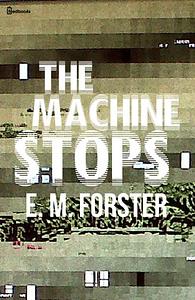Take a photo of a barcode or cover
Für einen kurzen Moment erblickten V und K ein Meer aus Toten und, bevor sie sich mit ihm vereinten, einen Streifen makellosen Himmels.
Yikes! Written in 1909, this story reads as a parody of modern life. Alternately, one wonders if somehow people reading this story were inspired by its ideas and mistook it for a guide, reading it literally, ignoring the ironic tone, instead of as dystopia and cautionary tale. A disturbing sensation.
"Vashti was seized with the terrors of direct experience."
"'Beware of first-hand ideas!...First-hand ideas do not really exist.'...Let your ideas be second-hand, and if possible tenth-hand, for then they will be far removed from that disturbing element - direct observation."
The story serves as a reminder to use the body and to appreciate our corporeality. It invites us to open our windows, go outside, let the sun and the rain fall on us, and explore the world. Let us move freely, be present with and touch each other. Let us enjoy a sense of openness and space. Go forth!
It emphasizes the value of direct experience and observation.
After writing this Goodreads review, it's tempting to post to Facebook and share the ideas within! Oh, dear. Go to yoga and walk the dogs instead?
Quotable:
"She knew several thousand people, in certain directions human intercourse has advanced enormously."
"The room, although it contained nothing, was in touch with all that she cared for in the world."
"It was naked, humanity seemed naked, and all these tubes and buttons and machineries neither came into the world with us, nor will they follow us out, nor do they matter supremely while we are here."
"But Humanity, in its desire for comfort, had over-reached itself. It had exploited the riches of nature too far. Quietly and complacently, it was sinking into decadence, and progress had come to mean the progress of the Machine."
Pairs well with: To wallow in the dystopic impulses, GeorgeOrwell's 1984 and the short story "Division of Labor," by Benjamin Roy Lambert in Lightspeed Magazine.
To break free and venture out, "Wanderlust: A History of Walking," by Rebecca Solnit.
"Vashti was seized with the terrors of direct experience."
"'Beware of first-hand ideas!...First-hand ideas do not really exist.'...Let your ideas be second-hand, and if possible tenth-hand, for then they will be far removed from that disturbing element - direct observation."
The story serves as a reminder to use the body and to appreciate our corporeality. It invites us to open our windows, go outside, let the sun and the rain fall on us, and explore the world. Let us move freely, be present with and touch each other. Let us enjoy a sense of openness and space. Go forth!
It emphasizes the value of direct experience and observation.
After writing this Goodreads review, it's tempting to post to Facebook and share the ideas within! Oh, dear. Go to yoga and walk the dogs instead?
Quotable:
"She knew several thousand people, in certain directions human intercourse has advanced enormously."
"The room, although it contained nothing, was in touch with all that she cared for in the world."
"It was naked, humanity seemed naked, and all these tubes and buttons and machineries neither came into the world with us, nor will they follow us out, nor do they matter supremely while we are here."
"But Humanity, in its desire for comfort, had over-reached itself. It had exploited the riches of nature too far. Quietly and complacently, it was sinking into decadence, and progress had come to mean the progress of the Machine."
Pairs well with: To wallow in the dystopic impulses, GeorgeOrwell's 1984 and the short story "Division of Labor," by Benjamin Roy Lambert in Lightspeed Magazine.
To break free and venture out, "Wanderlust: A History of Walking," by Rebecca Solnit.
The Machine Stops: 4 stars.
The Celestial Omnibus: 3 stars.
So 3.5 stars overall.
The Celestial Omnibus: 3 stars.
So 3.5 stars overall.
adventurous
dark
mysterious
medium-paced
Clear links to Wells’s The Time Machine. Quite chilling in places, really enjoyed. Very different from Howards End.
Felt like it skimmed a lot of heavy concepts for a short story but very very prescient
(3.5 stars) If you're a Forster fan and stumbled into this anomaly, you might have been as confused as I was and thought why he of all people decided to write a sci-fi story, or, more importantly, would it actually be good?
Luckily, it's well worth the read. Well-written and with an eerie ending, it's especially recommended for those whose gadgets have been glued into their hands and brains instead of being mere tools of communication. A monochromatic world, completely devoid of original thought and individualism, that will be eaten alive by its technology is not the kind of world I want to end up in.
Luckily, it's well worth the read. Well-written and with an eerie ending, it's especially recommended for those whose gadgets have been glued into their hands and brains instead of being mere tools of communication. A monochromatic world, completely devoid of original thought and individualism, that will be eaten alive by its technology is not the kind of world I want to end up in.
This was fine, sometimes it is hard to accept that an author elected to stay with a short story or novella when so much more could have been done with it. Having just read this, and [b:This Crowded Earth|6314423|This Crowded Earth|Robert Bloch|http://d.gr-assets.com/books/1348552816s/6314423.jpg|6499655], I am feeling kind of inspired to look for groups based on dystopian fiction and gather some more suggestions for earlier works. had an odd experience as i was listening to a Librivox recording and the firt narrator sounded just like i think i sound. Kind of eerie!
4 stars for a wonderful dystopian novel
1 extra star for writing this visionary story in 1909
In a future world people are living in isolated cubicles, they only interact with other humans though the screen and spend the day following other peoples "presentations" or present a totally meaningless topic to others.
As they never interact with the real world all knowledge are secondhand, they even encourage people to avoid firsthand impressions but rely more on interpretations of interpretations.
As the "machine" are their only contact point to anything and caters for their every need, it gradually takes on a religious role for them to the extent they starts worshiping it, forgetting over time that they actually built it themself (and have to maintain it as well).
The end is only to predictable.....
A little scary to recognize many of the trends in our own society, maybe it's time to give the smartphone a long break.
1 extra star for writing this visionary story in 1909
In a future world people are living in isolated cubicles, they only interact with other humans though the screen and spend the day following other peoples "presentations" or present a totally meaningless topic to others.
As they never interact with the real world all knowledge are secondhand, they even encourage people to avoid firsthand impressions but rely more on interpretations of interpretations.
As the "machine" are their only contact point to anything and caters for their every need, it gradually takes on a religious role for them to the extent they starts worshiping it, forgetting over time that they actually built it themself (and have to maintain it as well).
The end is only to predictable.....
A little scary to recognize many of the trends in our own society, maybe it's time to give the smartphone a long break.







